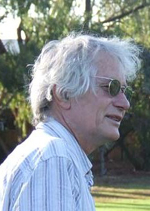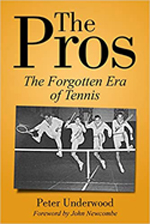Tilden's Demons
Peter Underwood

About mid-way through his life, Tilden's personal demons began nosing their way from the private into the public space. A chasm lay between the performer and the person behind it.
Who was behind Tilden's many masks? Nabokov's invented character of "Ma Tilden" (Click Here) suggests the answer: Big Bill Tilden, champion male athlete, was not only single and deeply alone, but homosexual and with a predilection for boys.
Increasingly, he found this difficult to keep quiet. Finally, the inevitable: in 1947 Tilden was nabbed with a teenage boy, hauled before the court, charged with indecency with minors, found guilty and sent to prison.
Now fame and honors meant nothing. Gone was the hero strutting the world stage. Instead he was a tired old queen, broke and ostracized by the society that had lionized him.
In his glory days Big Bill surrounded himself with people. In truth, he was always a loner. Now he was alone. And worst of all, banned from tennis, he could no longer practice his only creative outlet.
Where lay the seeds of such a fall? To appreciate the sad majesty of the aging pro, we need to delve into Tilden's family.
The Making of a Tragic Hero
William Tatem Tilden Junior was born at the end of the nineteenth century to a rich Philadelphia family. William's early life had all the appurtenances of comfort and security, including servants and horses. His father, William Tatem Senior, was a successful merchant. His mother, Linie, was also of good family and a fine musician. Yet by the time young William arrived in February 1893, the calm and security of the household had already been sundered.

William Senior and Linie Tilden had commenced a family some 13 years before the birth of William. The first child, Elizabeth, was born in 1880, to be followed by Harry in 1881 and then Williamina in 1883. From all accounts, family life was that of a normal, privileged family.
Then in 1884 tragedy struck. It took the form of the second horseman of the apocalypse: disease. In a period of less than three weeks, from November 29 to December 15, all three children were taken off by diphtheria. In a stroke, the parents had lost their family. The grief stricken Linie never recovered her emotional stability.
So it was into a haunted family that the second batch of children emerged. In 1887, came William's older brother Herbert. Six years later, in 1893, arrived the present hero, thereafter known in the family as Junior.
This was now no normal family. From his birth, William's ravaged mother spoiled, overprotected and terrified the young boy whom she had desperately wanted to be a girl.
The disturbed Linie inculcated into young William a dread that others were primarily a reservoir of contagion. She attached a particular fear to the female. According to his biographer Frank Deford, the only sex training Tilden ever received was that women were a source of venereal disease.

Isolated, terrified by the dangers of human contact, yet molly coddled and indulged, the boy was raised as a fragile sickly creature. No wonder he grew up proud and superior, but incapable of warm human contact.
If this was not enough, more tragedy followed. The musical mother he doted on developed a chronic kidney condition. By the time Junior was 15 years old, she was an invalid in a wheelchair.
As a result, Tilden was moved into the nearby home of his maiden aunt. For the next 33 years, it was junior's only home. From there, says Deford, the teenager would dutifully walk over to the ghost-filled family home to visit his dying mother.
He sat beside her on the terrace, with a nurse hovering in the background. Sometimes they would listen to music. When she died three years later, the 18-year-old William was inconsolable.
For the next four years, the young man struggled and drifted. There was an aborted attempt to study at the University of Pennsylvania, some teaching of tennis at his old school and part-time journalism for a local newspaper.
More Death
Then, once more, the Horseman reappeared. In July of 1915, his father, always distant and virtually absent since Linie's death, died suddenly of heart disease.

Two months later, it was the turn of the last of the family: William's older brother, Herbert. The person who had introduced William to tennis--and who played with him frequently at the Germantown cricket club. Herbert was a man's man, an extrovert, a drinker and keen on the ladies.
One day he caught a cold. Three days later he was dead, presumed from pneumonia. At 22 years, William Tatem Junior was the family. For months, immobilized by despair, tennis saved him.
This young man, his family eradicated, came to see that there was only one way to give meaning to his life: to discover a cause. Deford helps us see that, in Tilden's eyes, the cause had to be bigger than he was and a creative engagement to which his love for his lost and musical mother could be tuned.

Survival would have been an achievement for someone in his position. Yet Tilden, bereft of family, did better than survive, he reached the top of the world in his chosen career.
The force of the loss seems to have focused the young man's energy, but the past never let him go. Though Tilden had always been homosexual, the drive had been more or less hidden, and eclipsed by the adulation of the triumphant years.
And Tilden was not only homosexual, a difficult enough fate in an era that criminalized homosexuality. He was drawn to teenage boys, a different matter.
Even during the 1920s and Tilden's ascendency, the players and officials knew, but kept quiet, and the man himself was discreet. By the time he had turned pro, discretion was falling away.
To the other pros it was something they had to know about, not least to protect the tour. For instance, though loyal Budge and Perry say little, what they say is enough.
Perry tells us that to avoid irate fathers, the pro and would often have to change cars and get out of town fast, while Budge mentions that Big Bill's escapades on the road would be hushed up by making sure certain towns were avoided from then on.
Alas, even the transient measure of comfort such liaisons might be expected to provide was absent. Deford says of Tilden that even his homosexual experiences were surface in nature.
With sadness, but luminous clarity, the biographer concludes: "More than any man, Bill Tilden diverted his sex drive to the arena, to a clean, bright place." But the edges of the old pro tour were hardly clean and bright.





